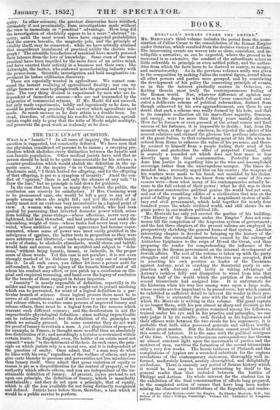'lilt TRUE LUNACY QUESTION.
WitAT is a " lunatic " ? In all cases of inquiry, the fundamental question is suggested, but constantly deferred. We have seen that one physician considered all persons to be insane ; a sweeping pre- dication which abolishes every distinction between the lunatic and non-lunatic population. Other medical jurists have said that no
person should be held to be quite unaccountable for his actions; a counter-predication which would abolish the definition in the op- posite sense. At the inquiry "in re Cumming," Sir Alexander Mackenzie said, "I think hatred for offspring, and for the offspring of that offspring, is per se a symptom of insanity." Amid the con- flict of "opinion," there is not only the absence of any rule "to draw the line," but no principle is laid down for guidance. In the case that has been so many days before the public, the
conclusion can scarcely be satisfactory. If Mrs. Cumming were to be pronounced sane, she would be left a prey to any set of people among whom she might fall ; and yet the verdict of in- sanity must rest on evidence very inconclusive in. a logical point of view. A woman who was perverse and wilful, who had been spoiled by possessing that inverted domestic power which arises from holding the purse-strings—whose affections, never very en- lightened, had been thwarted, and had perhaps died out under the benumbing weight of time—whose tastes had never been very ele- vated, whose ambition of personal appearance had become super- annuated, whose sense of power was most easily gratified in the indulgence of caprices, the better tests in proportion as they were more arbitrary and irrational,—such a person resorting with barely a relic of shame, to alcoholic stimulants, would storm and babble; would hate and accuse, would be mystified and subject to "delu- sions," without being lunatic, insane, or imbecile, in the proper sense of those words. Yet this case is not peculiar; it is not even strongly marked of its dubious type, but is only one of numbers like it. In all such cases, you either let loose a person unfit for self-conduct, to the great injury of the lunatic himself and of all whom his conduct may affect, or you patch up a conclusion on jib-
and empirical reasoning, and hand over the legacy of confusion r the benefit of those engaged in future inquiries.
"Insanity" is nearly impossible of definition, especially in its
milder and vaguer forms ; and yet we ought not to permit misdoing which can be prevented, for want of a logical definition in a par- ticular branch of science. Some logical process there must be to arrive at all conclusions; and if we resolve to secure some lunatics and release others, to confine some persons of unproved lunacy and release others, there must be a logical form for the reasons which warrant such different courses ; and the desideratum is not the impracticable physiological definition—since nothing impracticable can be rationally desired—but the definition of the principles on which we actually proceed. In some countries they do not wait for proof of lunacy to restrain a man. A just disposition of property, for example, in }ranee, is thought more needful than an absolutely free distribution of it; and accordingly a testator is restrained within certain limits. In England, even, the holder of an estate must not Commit " waste " to the detriment of the heir. In such eases, the prin- ciple on which jurists rely is a moral one, and it is independent qf the question of sanity. Once admit that "a man may do what he likes with his own," regardless of the welfare of others, and you give carte blanche to passions and perversities not less mischievous than lunacy itself. Once admit that gross violation of equity or reason is per se a disqualification for the control of property, or for authority which affects others, and you are independent of the un- attainable definition of lunacy. At present, juries pretend to ad upon one principle, the definition of lunacy, which is manifestly unattainable ; and they do act upon a principle, that of equity, which is all the less available for not being distinctly recognized and defined. Jurists have before them, therefore, a task which it would be a public service to perform.


























 Previous page
Previous page